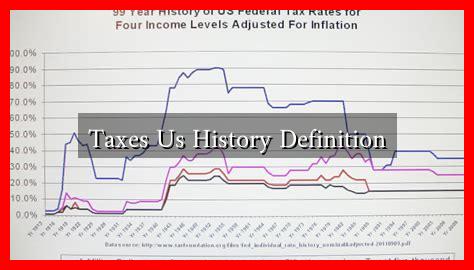-
Table of Contents
- Understanding Taxes in U.S. History: Definition and Evolution
- What Are Taxes?
- The Early Days: Colonial Taxation
- The Birth of a Nation: Taxation and the Constitution
- The Evolution of Taxation in the 19th and 20th Centuries
- Modern Taxation: Challenges and Reforms
- Conclusion: The Ongoing Importance of Taxes in American Society
Understanding Taxes in U.S. History: Definition and Evolution
Taxes have played a pivotal role in shaping the United States, influencing its economy, governance, and social structure. From the early colonial days to the modern era, taxation has evolved significantly, reflecting the changing needs and values of American society. This article delves into the definition of taxes, their historical context in the U.S., and their impact on the nation.
What Are Taxes?
Taxes are mandatory financial charges imposed by a government on individuals and businesses to fund public services and infrastructure.
. They can take various forms, including income tax, sales tax, property tax, and excise tax. The primary purpose of taxation is to generate revenue for government operations, including education, healthcare, defense, and public safety.
The Early Days: Colonial Taxation
The roots of taxation in the United States can be traced back to the colonial period. The British government imposed several taxes on the American colonies, which laid the groundwork for future tax policies. Some notable examples include:
- The Stamp Act (1765): This was one of the first direct taxes imposed on the colonies, requiring them to purchase special stamped paper for legal documents, newspapers, and other publications.
- The Townshend Acts (1767): These acts imposed duties on imported goods such as tea, glass, and paper, leading to widespread protests and boycotts.
- The Tea Act (1773): This act granted the British East India Company a monopoly on tea sales in the colonies, culminating in the Boston Tea Party as a protest against taxation without representation.
These early tax policies fueled resentment among colonists and contributed to the revolutionary spirit that ultimately led to the American Revolution.
The Birth of a Nation: Taxation and the Constitution
After gaining independence, the new nation faced significant financial challenges. The Articles of Confederation, the first governing document, lacked the power to levy taxes, leading to economic instability. This prompted the drafting of the U.S. Constitution in 1787, which granted Congress the authority to impose taxes.
Article I, Section 8 of the Constitution explicitly states that Congress has the power to “lay and collect Taxes, Duties, Imposts and Excises.” This provision established a framework for federal taxation, allowing the government to generate revenue to support its functions.
The Evolution of Taxation in the 19th and 20th Centuries
Throughout the 19th and 20th centuries, the U.S. tax system underwent significant changes, influenced by economic conditions and social movements. Key developments include:
- The Civil War Income Tax (1861): To finance the war, the federal government introduced the first income tax, which was temporary but set a precedent for future taxation.
- The 16th Amendment (1913): This amendment allowed Congress to levy an income tax without apportioning it among the states, leading to the establishment of a progressive income tax system.
- The New Deal (1930s): In response to the Great Depression, President Franklin D. Roosevelt implemented various tax reforms to stimulate the economy and provide relief to struggling Americans.
Modern Taxation: Challenges and Reforms
Today, the U.S. tax system is complex, with multiple layers of taxation at the federal, state, and local levels. The Internal Revenue Service (IRS) oversees federal tax collection, while states and municipalities impose their own taxes. Key challenges facing the modern tax system include:
- Tax Evasion: The IRS estimates that billions of dollars are lost each year due to tax evasion, prompting calls for stricter enforcement and reform.
- Equity and Fairness: Debates continue over the fairness of the tax system, particularly regarding the burden on low- and middle-income families compared to wealthy individuals and corporations.
- Tax Reform: Various administrations have proposed tax reforms aimed at simplifying the tax code and addressing issues of equity and efficiency.
Conclusion: The Ongoing Importance of Taxes in American Society
Taxes have been a fundamental aspect of U.S. history, shaping the nation’s development and influencing its economic landscape. From the early colonial protests against British taxation to the modern complexities of the tax system, the evolution of taxes reflects broader societal changes and challenges. Understanding this history is crucial for comprehending current debates surrounding taxation and its role in American life.
As the nation continues to grapple with issues of equity, efficiency, and revenue generation, the legacy of taxation remains a vital part of the American story. For further reading on U.S. taxation history, you can explore resources from the Internal Revenue Service and the Tax History Project.





